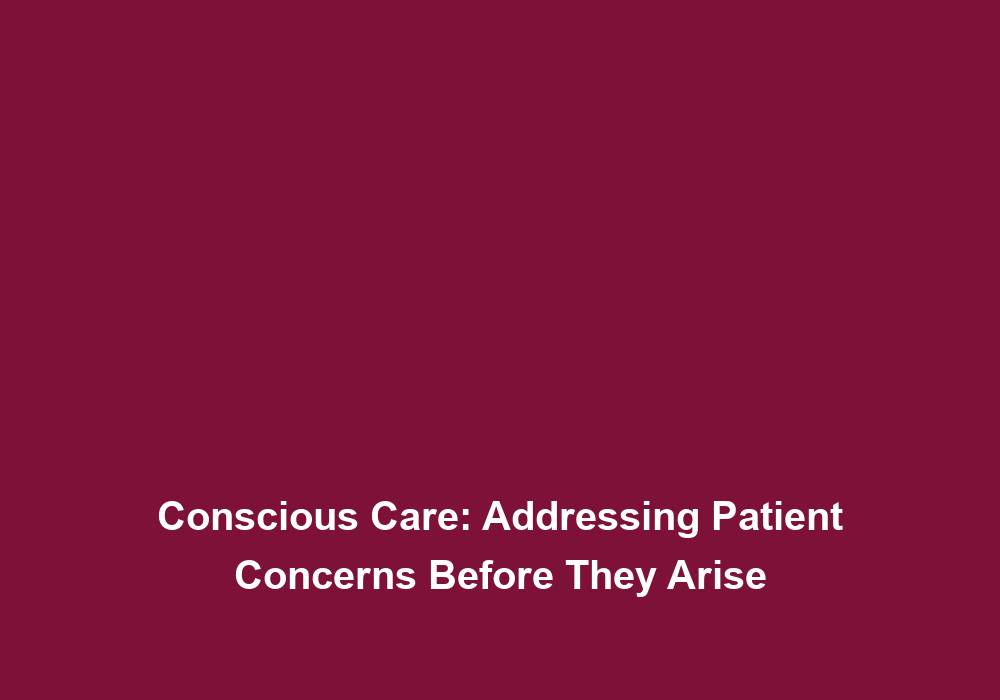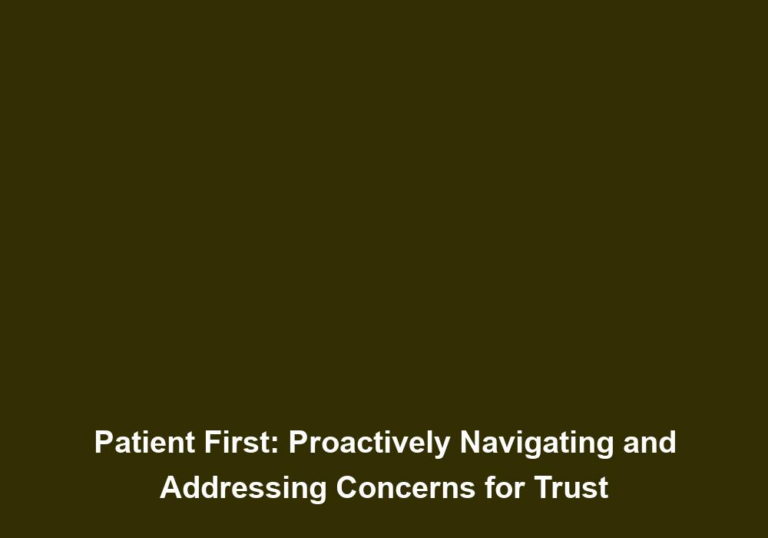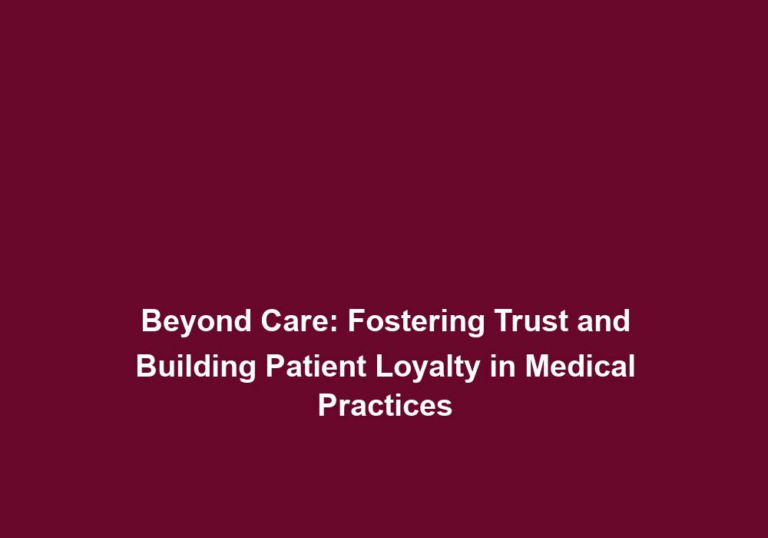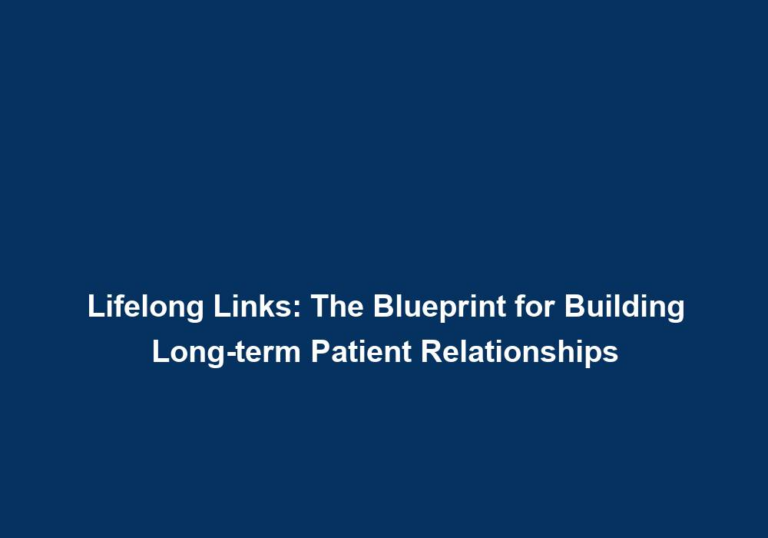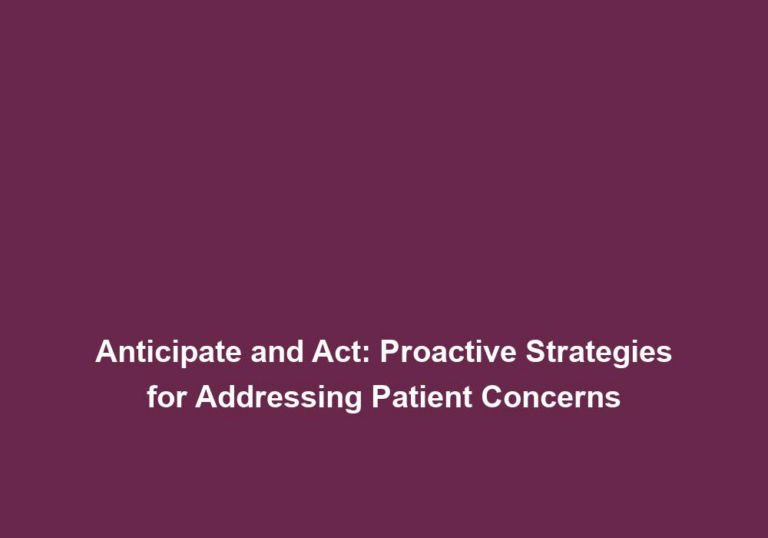Conscious Care: Addressing Patient Concerns Before They Arise
The healthcare industry is constantly evolving, and one of the key focuses today is on providing conscious care to patients. Conscious care involves anticipating and addressing patient concerns before they even arise, ensuring a proactive approach to healthcare. By being attentive to patient needs, healthcare professionals can create a positive and safe environment, enhancing the overall patient experience. In this article, we will delve into the importance of conscious care and discuss strategies to address patient concerns effectively.
Why is Conscious Care Important?
Conscious care is essential in improving patient outcomes, reducing medical errors, and enhancing patient satisfaction. By understanding and addressing patient concerns from the start, healthcare providers can create an environment that promotes trust, open communication, and collaboration. This approach not only leads to better patient outcomes but also fosters a positive and long-lasting relationship between patients and healthcare providers.
Here are some reasons why conscious care is important:
- Improved Patient Outcomes: By proactively addressing patient concerns, healthcare providers can prevent potential complications and ensure better treatment outcomes.
- Reduced Medical Errors: Anticipating patient concerns allows healthcare professionals to avoid errors in diagnosis, medication administration, and treatment planning.
- Enhanced Patient Satisfaction: Addressing patient concerns before they arise demonstrates a commitment to patient well-being and helps create a positive healthcare experience.
Strategies for Addressing Patient Concerns
1. Effective Communication
Clear and open communication is the foundation of conscious care. Healthcare providers should establish a strong rapport with patients, actively listening to their concerns and providing clear explanations regarding their medical condition, treatment options, and potential risks. Patients should feel comfortable asking questions and expressing any anxieties they may have. By fostering effective communication, healthcare providers can alleviate patient concerns and build trust.
Here are some key points to consider for effective communication:
- Actively listen to patients, allowing them to express their concerns fully.
- Use clear and understandable language when explaining medical information.
- Encourage patients to ask questions and provide them with adequate time to do so.
- Use visual aids or diagrams to enhance understanding, if necessary.
- Provide reassurance and empathy to help alleviate anxiety.
2. Preemptive Education
Educating patients about their medical condition and treatment plan is crucial in addressing concerns before they arise. Healthcare providers should strive to provide comprehensive and easy-to-understand information, empowering patients to actively participate in their own care. This can include written materials, online resources, and interactive discussions that clarify expectations, potential side effects, and self-care strategies. By proactively addressing potential concerns, patients are better equipped to navigate their healthcare journey with confidence.
Consider the following strategies for preemptive education:
- Provide written materials that explain the medical condition, treatment options, and potential risks in a clear and concise manner.
- Utilize online resources, such as patient education websites or videos, to supplement information and enhance understanding.
- Encourage patients to ask questions and seek clarification during educational sessions.
- Use visual aids, such as diagrams or models, to help patients visualize complex medical concepts.
- Provide patients with personalized care instructions and self-care strategies to address potential concerns.
3. Emphasizing Patient Safety
Patient safety is a top priority in conscious care. Healthcare providers must maintain a safe and secure environment to minimize the risk of errors, infections, and other adverse events. Implementing strict protocols and guidelines, such as hand hygiene practices, proper medication administration, and infection control measures, can significantly reduce patient concerns related to safety. Regular training and audits should also be conducted to ensure compliance and continuous improvement.
Here are some key considerations for emphasizing patient safety:
- Implement standardized protocols and guidelines for infection control, medication administration, and patient identification.
- Conduct regular training sessions to ensure healthcare providers are knowledgeable about safety procedures and protocols.
- Encourage healthcare providers to report any potential safety concerns or near-miss incidents.
- Conduct regular audits to identify areas for improvement and ensure compliance with safety standards.
- Communicate safety measures to patients and their families to instill confidence and trust in the healthcare facility.
4. Personalized Care Plans
Every patient is unique, and tailoring care plans to individual needs is essential in addressing concerns effectively. Healthcare providers should take into consideration patients’ cultural backgrounds, personal preferences, and social circumstances when designing care plans. By acknowledging and respecting these factors, patients feel heard and understood, leading to enhanced trust and satisfaction. Additionally, personalized care plans can help address concerns relating to treatment adherence, lifestyle adjustments, and emotional well-being.
Consider the following strategies for developing personalized care plans:
- Conduct thorough assessments to understand patients’ cultural beliefs, personal preferences, and social circumstances.
- Collaborate with patients to develop care plans that align with their goals and values.
- Provide educational materials and resources that are culturally sensitive and tailored to patients’ specific needs.
- Regularly reassess and adjust care plans based on patients’ changing needs and preferences.
- Offer emotional support and counseling services to address any psychosocial concerns.
5. Accessible Support Systems
Providing accessible support systems is key to addressing patient concerns promptly. Healthcare facilities should have mechanisms in place for patients to easily reach out for assistance or clarification, such as dedicated helplines, online portals, or patient navigators. These support systems ensure that patients can voice their concerns and receive timely guidance, reducing anxiety and improving overall satisfaction. Additionally, healthcare providers should offer clear instructions for post-care support and follow-up appointments to address any ongoing concerns.
Consider the following strategies for establishing accessible support systems:
- Implement a dedicated helpline or hotline for patients to seek assistance and address concerns.
- Develop an online portal or mobile application that allows patients to access information, schedule appointments, and communicate with healthcare providers.
- Assign patient navigators or care coordinators to guide patients through their healthcare journey and address any concerns.
- Provide clear instructions for post-care support, including contact information for follow-up questions or concerns.
- Establish a system for tracking and addressing patient feedback to continuously improve support systems.
6. Continual Quality Improvement
Conscious care is an ongoing process, and healthcare providers should continually strive for quality improvement. Regularly evaluating patient feedback, conducting surveys, and analyzing outcomes can help identify areas for improvement. This data-driven approach allows healthcare providers to proactively address any recurring concerns or gaps in care delivery, ensuring continuous enhancement of the patient experience.
Consider the following strategies for continual quality improvement:
- Implement a system for collecting and analyzing patient feedback through surveys, focus groups, or online platforms.
- Regularly review clinical outcomes and patient satisfaction scores to identify areas for improvement.
- Engage healthcare staff in quality improvement initiatives, encouraging them to identify areas for enhancement and propose solutions.
- Establish multidisciplinary teams to address specific concerns or challenges in the healthcare delivery process.
- Continuously monitor and evaluate the effectiveness of implemented improvements to ensure sustained positive impact.
Conclusion
Conscious care is a vital aspect of healthcare, emphasizing the importance of addressing patient concerns before they arise. By implementing effective communication strategies, providing preemptive education, prioritizing patient safety, personalizing care plans, creating accessible support systems, and continually improving quality, healthcare professionals can cultivate a patient-centric approach that enhances trust, satisfaction, and overall well-being. Adopting conscious care practices not only benefits patients but also strengthens the healthcare system as a whole.

